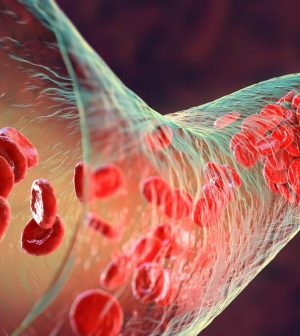- Could Your Grocery Store Meat Be Causing Recurring UTIs?
- Are You Making This Expensive Thermostat Error This Winter?
- Recognizing the Signs of Hypothyroidism
- 10 Strategies to Overcome Insomnia
- Could Artificial Sweeteners Be Aging the Brain Faster?
- Techniques for Soothing Your Nervous System
- Does the Water in Your House Smell Funny? Here’s Why
- Can a Daily Dose of Apple Cider Vinegar Actually Aid Weight Loss?
- 6 Health Beverages That Can Actually Spike Your Blood Sugar
- Treatment Options for Social Anxiety Disorder
Some HRT Pills May Pose Special Risk for Blood Clots

Certain hormone replacement therapy pills appear to increase the risk of heart disease and serious blood clots in women going through menopause, a new study says.
Estrogen/progestin pills increased women’s risk of heart disease by 21% and risk of life-threatening blood clots by 61%, researchers found.
Similarly, the synthetic hormone pill tibolone increased risk of heart disease by 46% and nearly doubled the risk of stroke and heart attack, results show.
However, tibolone did not increase risk of blood clots, “highlighting the varying effects of different hormones on cardiovascular disease,” wrote the research team led by Therese Johansson, a doctoral student with Uppsala University in Sweden.
Tibolone is not approved for use in the U.S., and its use has been decreasing in Sweden, researchers noted.
“This drop is encouraging; however, in 2018, approximately 1000 women initiated tibolone, which is estimated to have caused one stroke or … heart disease event,” the researchers wrote.
Hormone replacement therapy is used to relieve menopause symptoms such as hot flashes and night sweats.
For the study, researchers analyzed data on more than 919,000 healthy women in Sweden who were 50 to 58 years of age between 2007 and 2020.
Using monthly prescription records, the women were placed in one of seven different groups depending on the type of hormone replacement therapy they’d been given. An eighth group received no hormone therapy.
During a monitoring period of two years, more than 24,000 heart-related health problems were recorded.
Women who took oral estrogen/progestin or tibolone had an increased risk of heart disease that translates to about 11 new cases for every 1,000 women who start the treatment for one year, researchers said.
They found no increased risk of heart disease for hormone replacement therapies applied through the skin using patches, gels or creams.
However, these skin applications did increase the risk of dangerous blood clots, results show.
These results show that more research is needed to understand how hormone therapy might affect a menopausal woman’s risk of heart disease, researchers said.
Hormones like estrogen taken orally are metabolized in the liver, where many of the body’s blood coagulants are produced, researchers said. This could cause the liver to produce more coagulants, increasing the risk of dangerous blood clots.
That also could explain why skin hormone therapy doesn’t increase the risk of clots, because they largely bypass the liver during metabolism, researchers added.
The new study appears in The BMJ.
More information
The Cleveland Clinic has more on hormone therapy for menopause.
SOURCE: BMJ Group, news release, Nov. 27, 2024
Source: HealthDay
Copyright © 2026 HealthDay. All rights reserved.










